Entry-Level Marketing Resume Examples

Jul 18, 2024
|
12 min read
Craft the perfect entry-level marketing resume: Tips and tricks to get you noticed.
Rated by 348 people
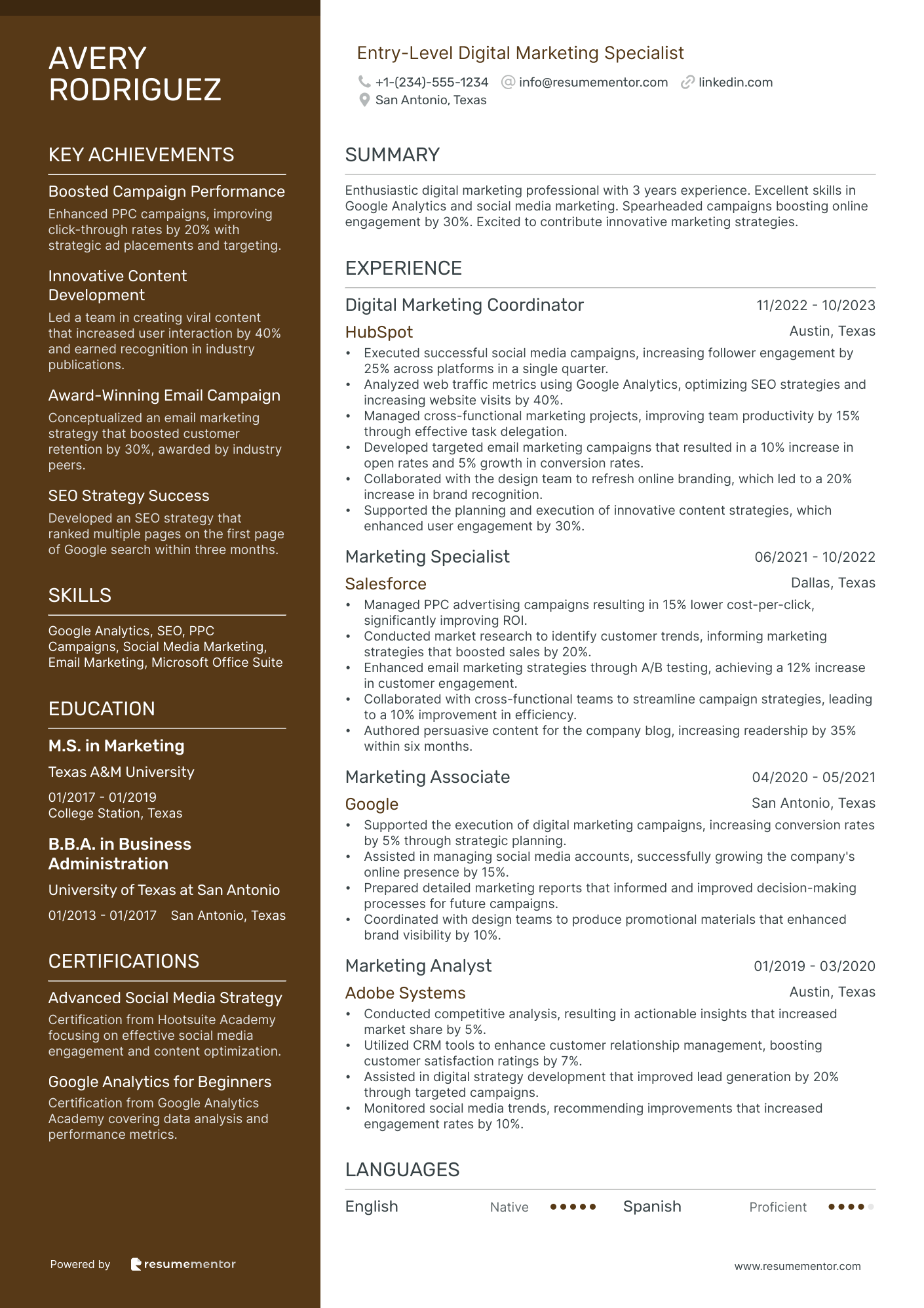
Entry-Level Digital Marketing Specialist
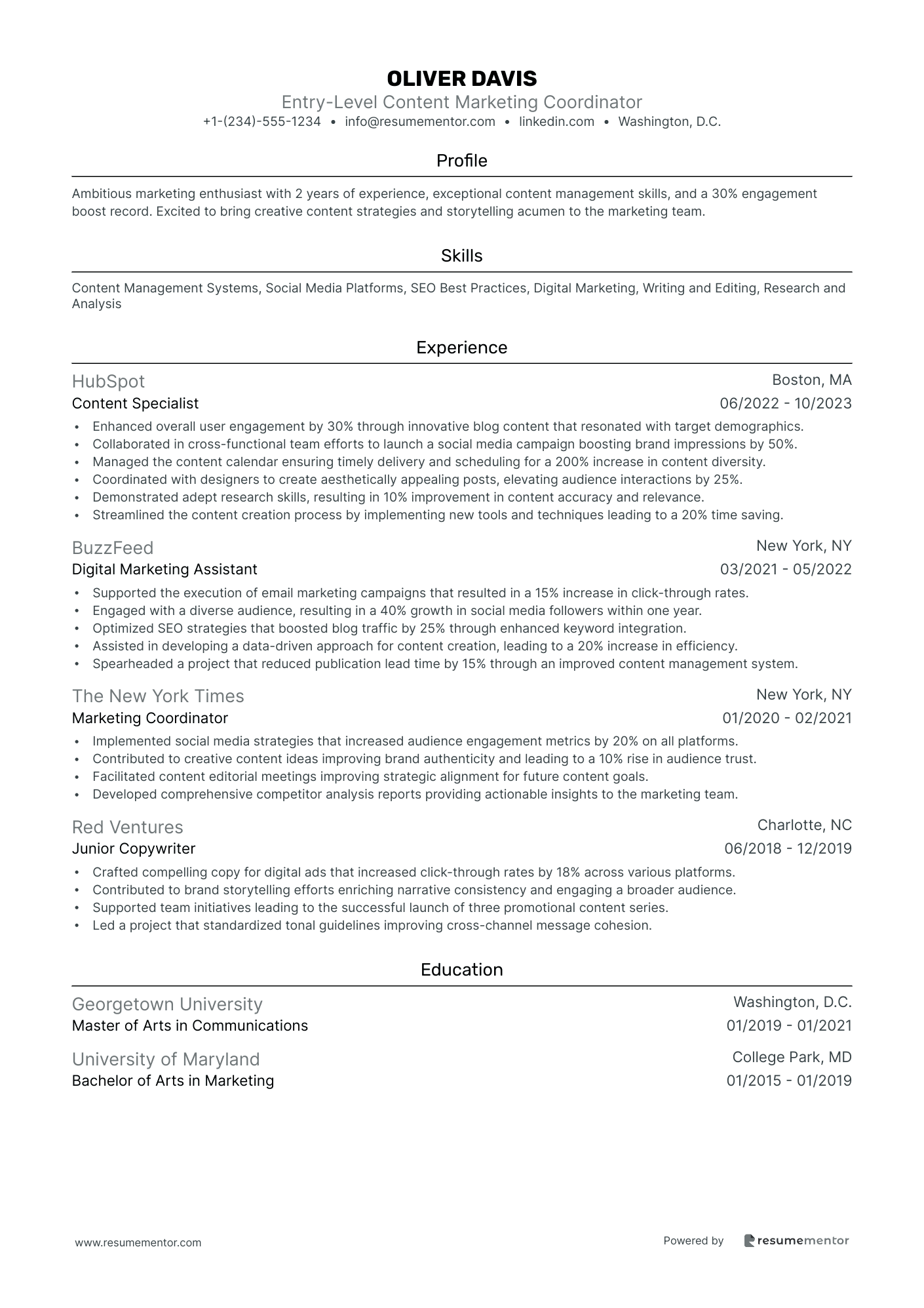
Entry-Level Content Marketing Coordinator
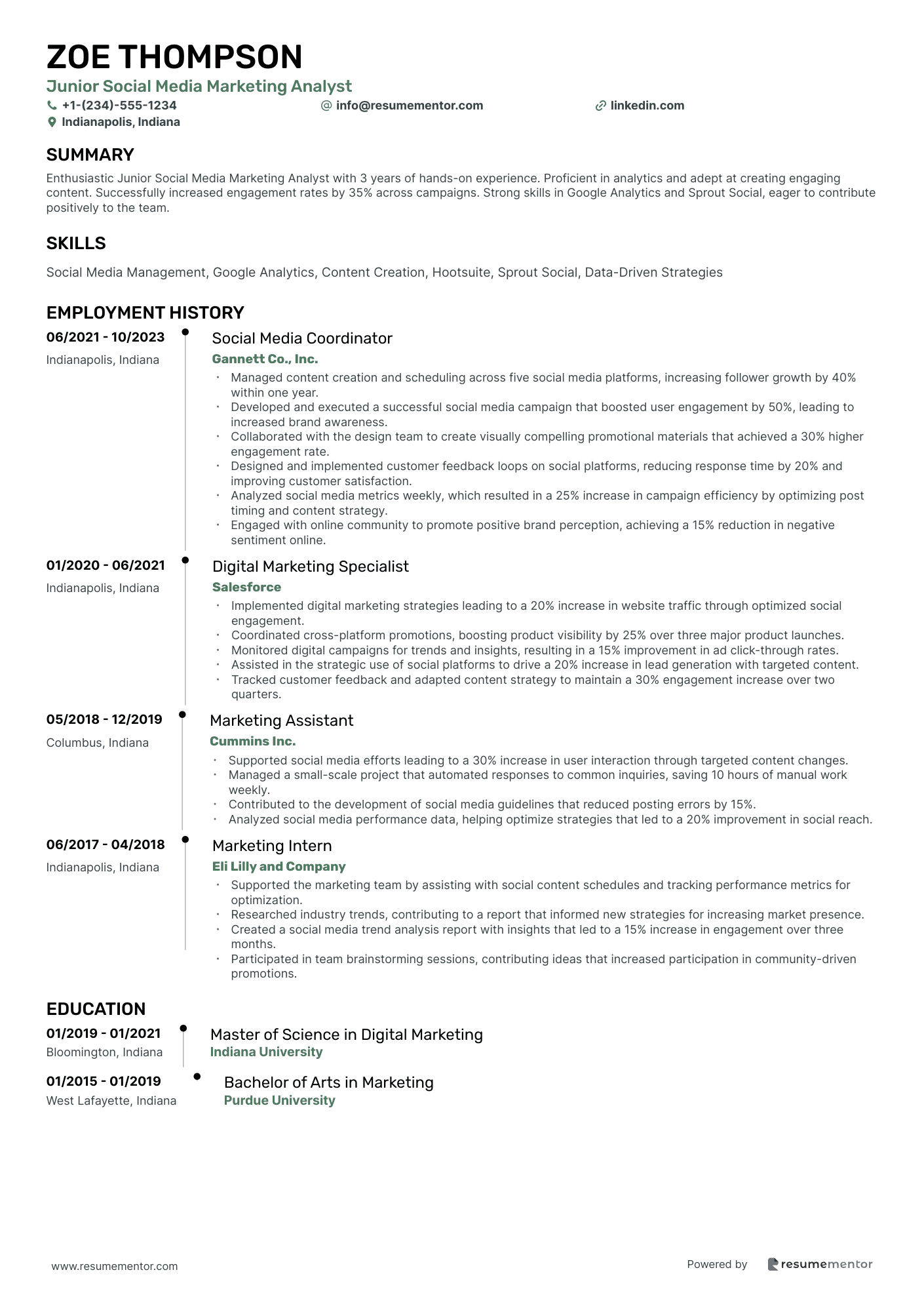
Junior Social Media Marketing Analyst
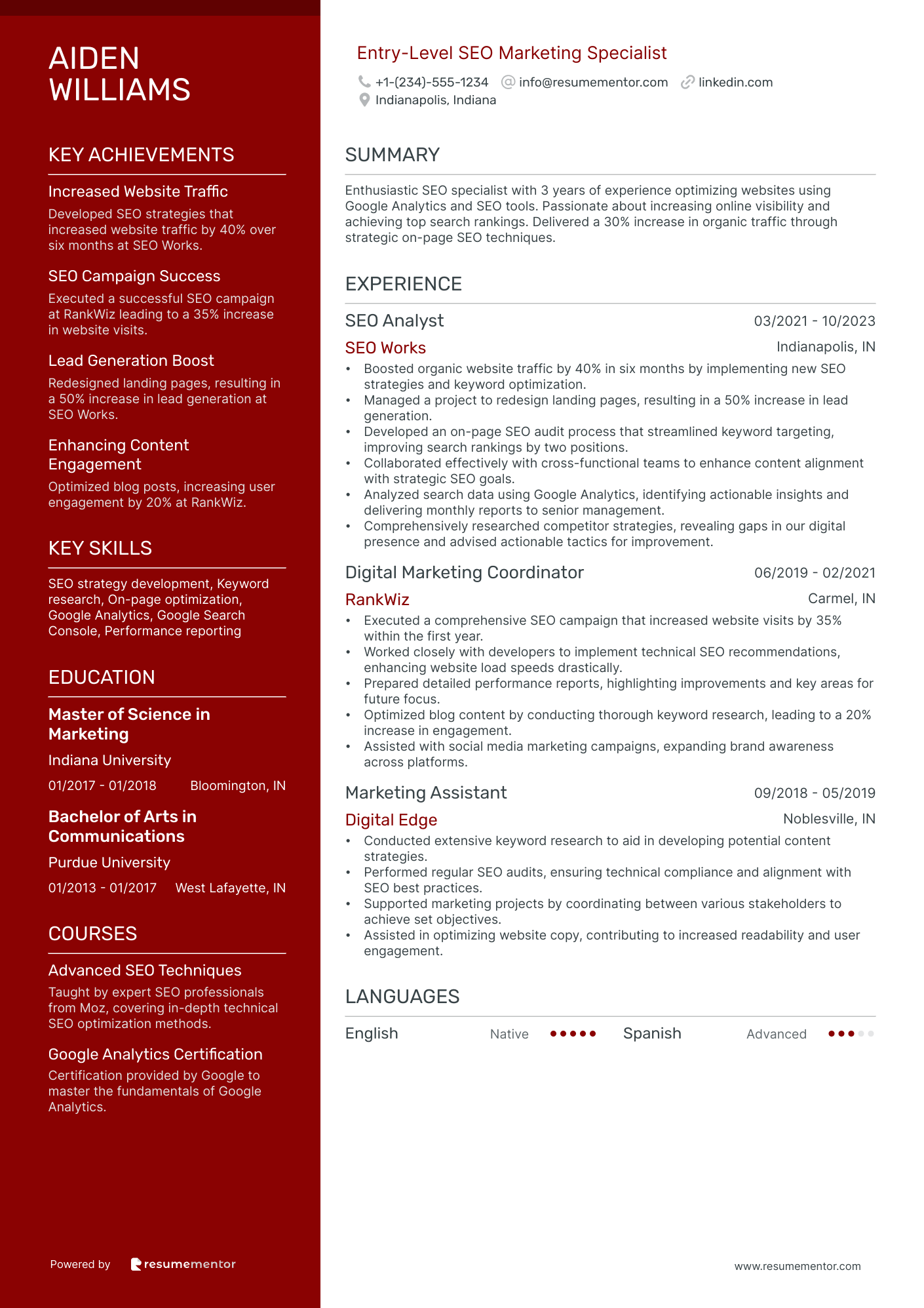
Entry-Level SEO Marketing Specialist
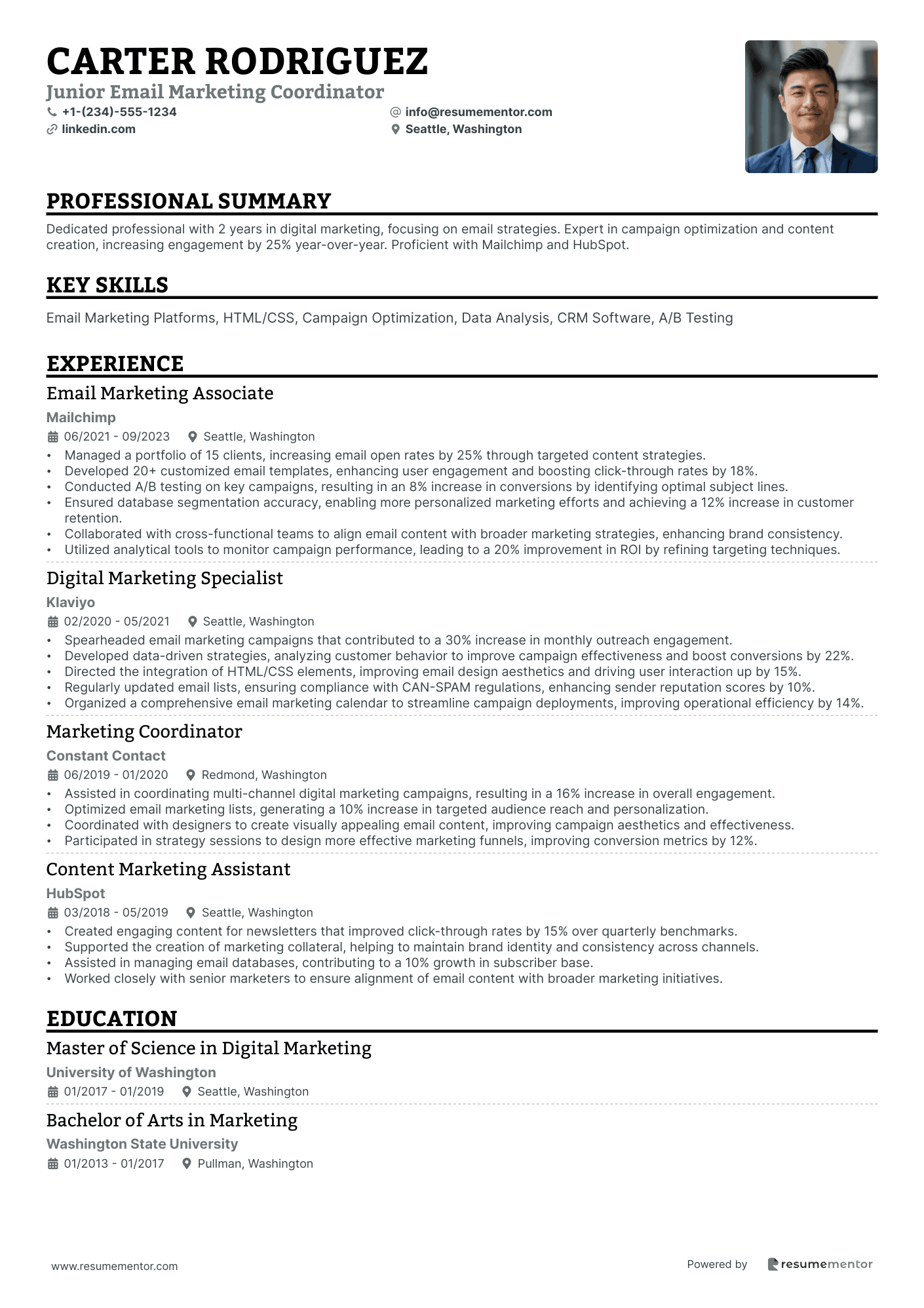
Junior Email Marketing Coordinator
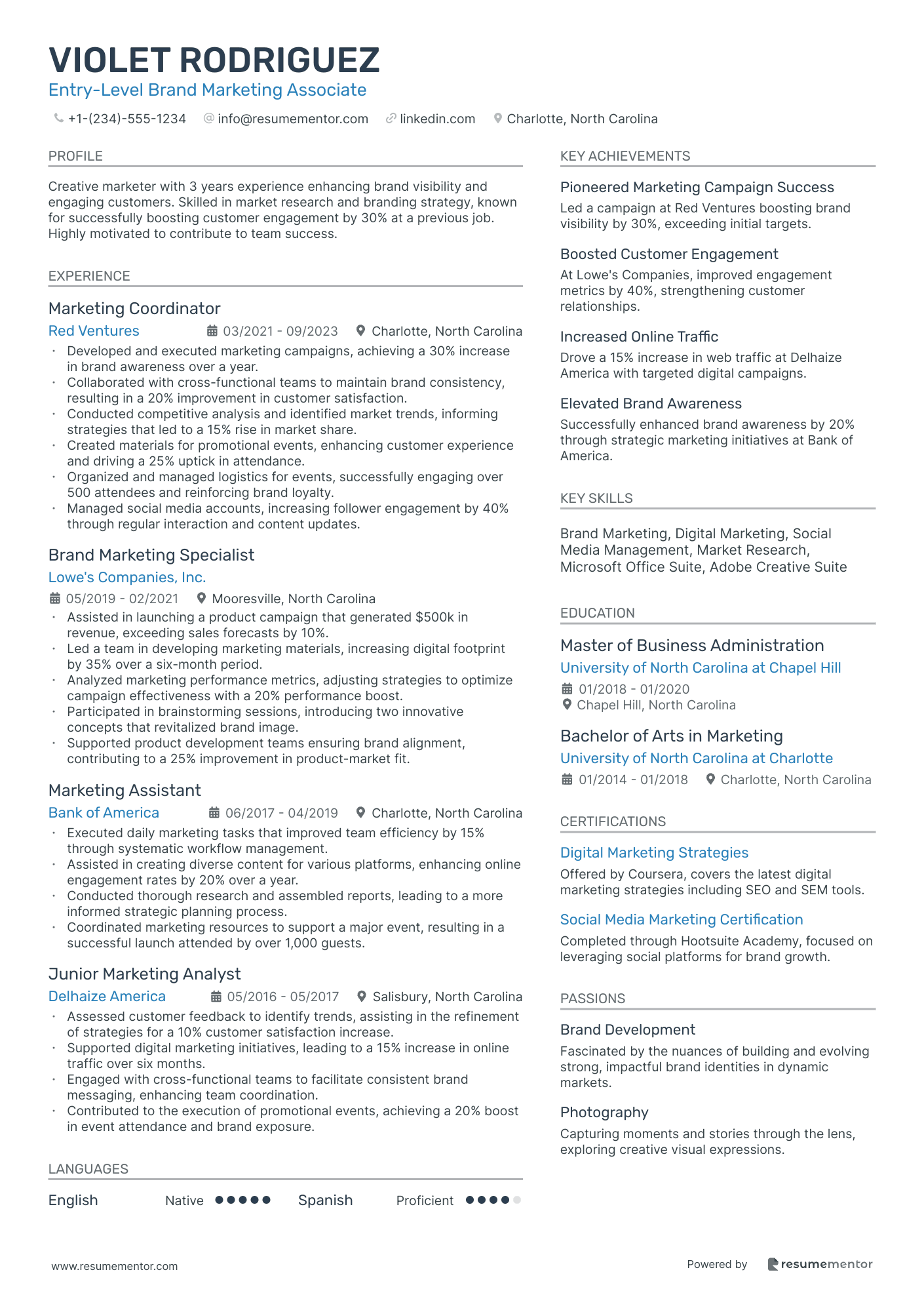
Entry-Level Brand Marketing Associate
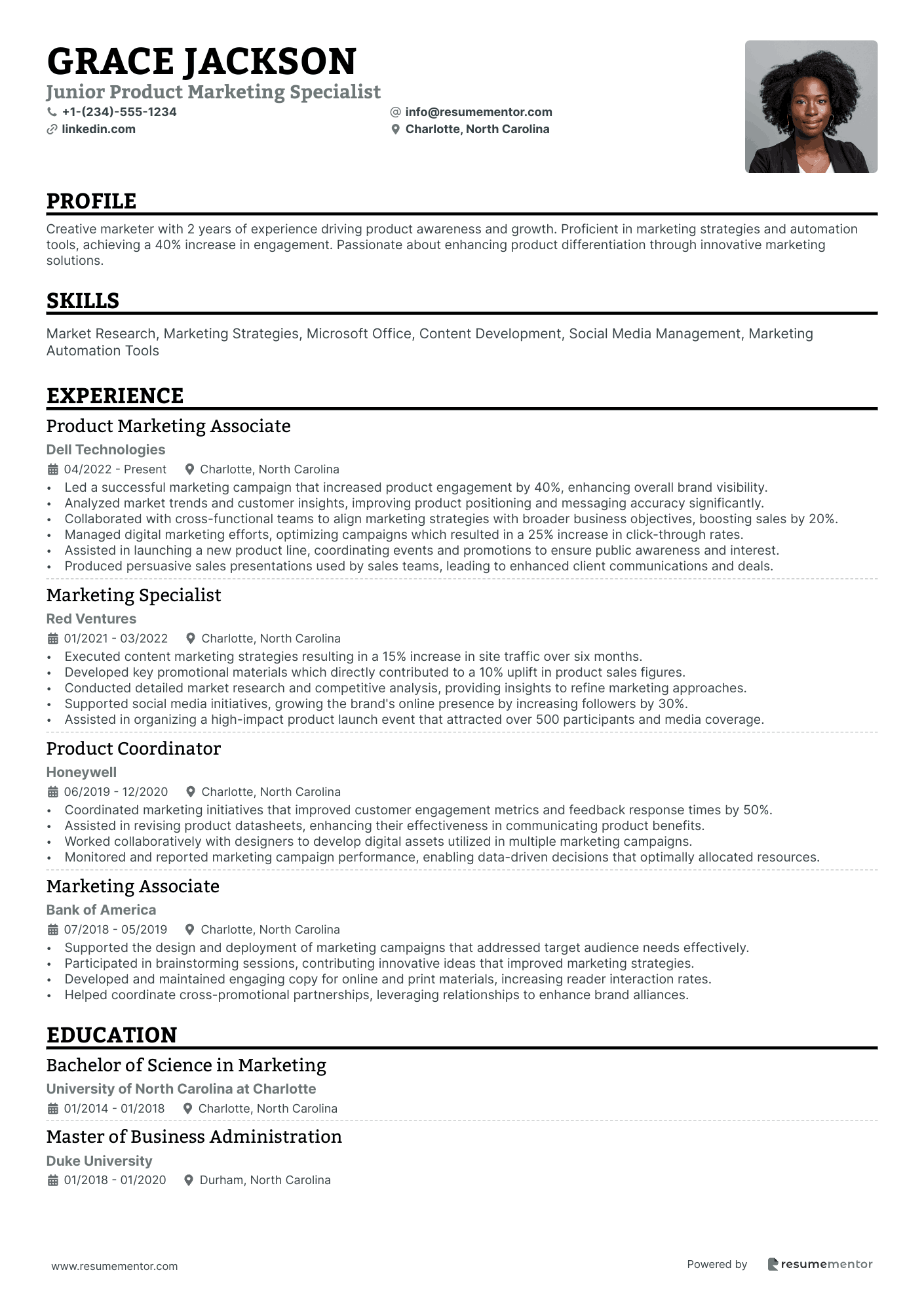
Junior Product Marketing Specialist
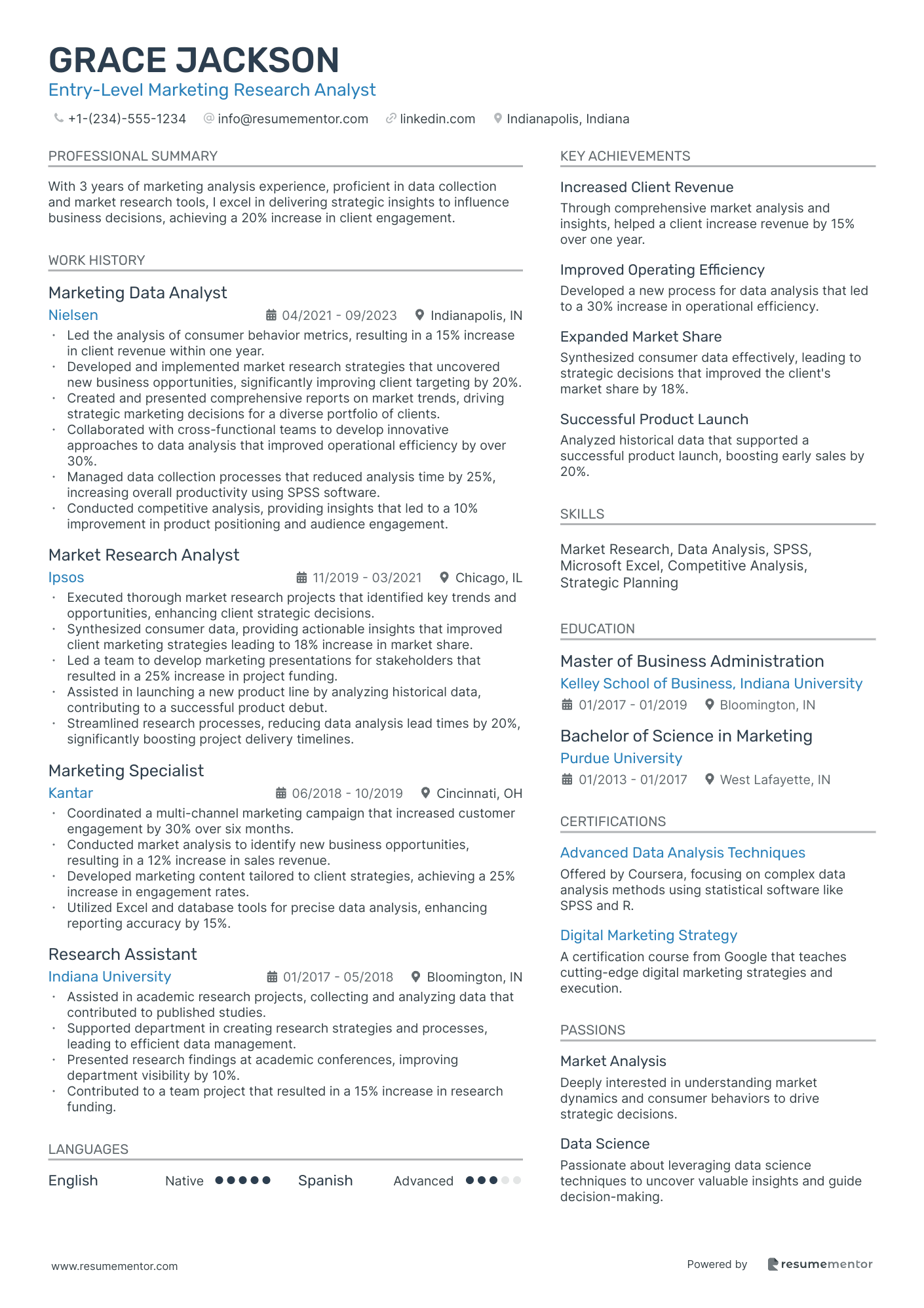
Entry-Level Marketing Research Analyst
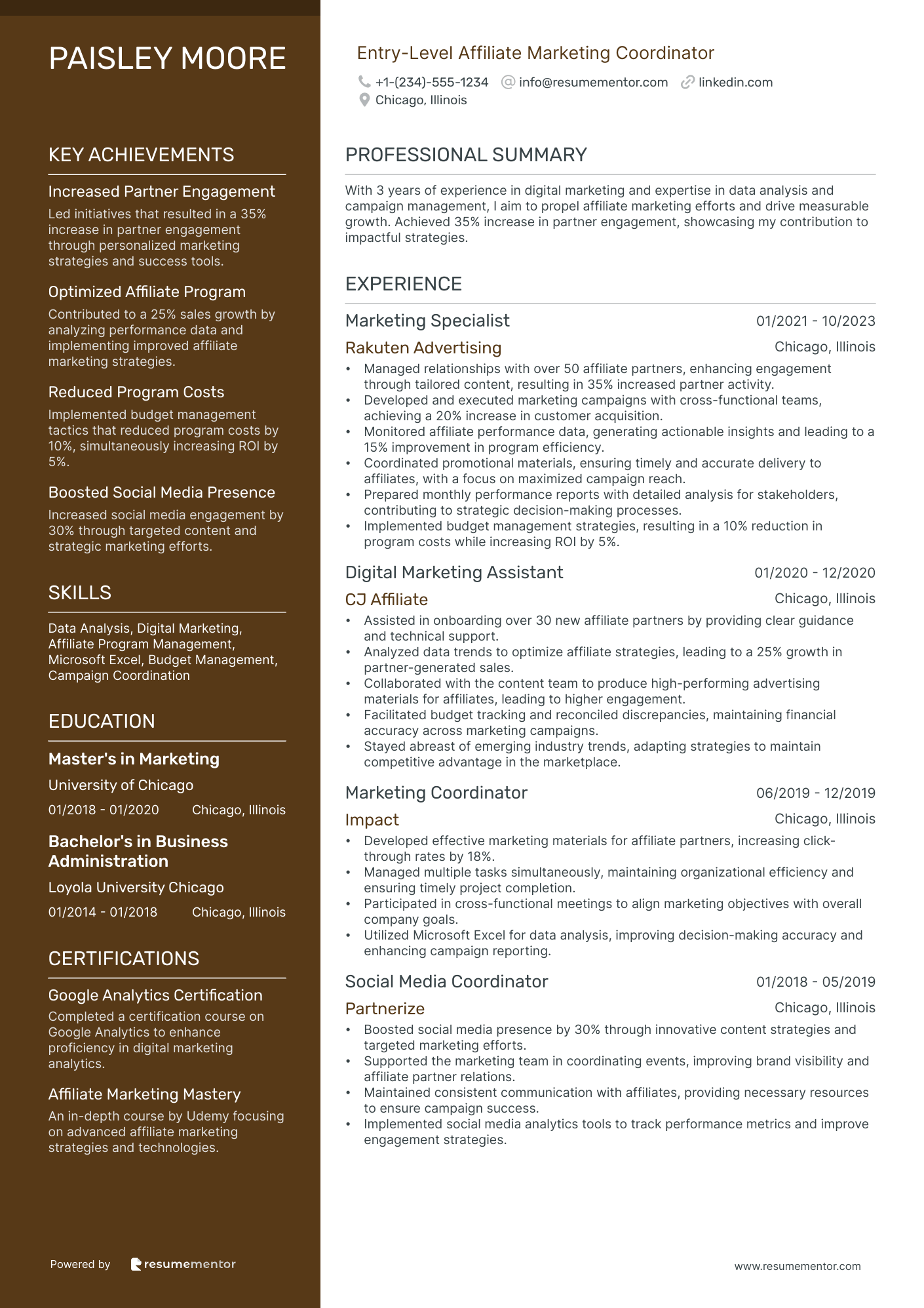
Entry-Level Affiliate Marketing Coordinator
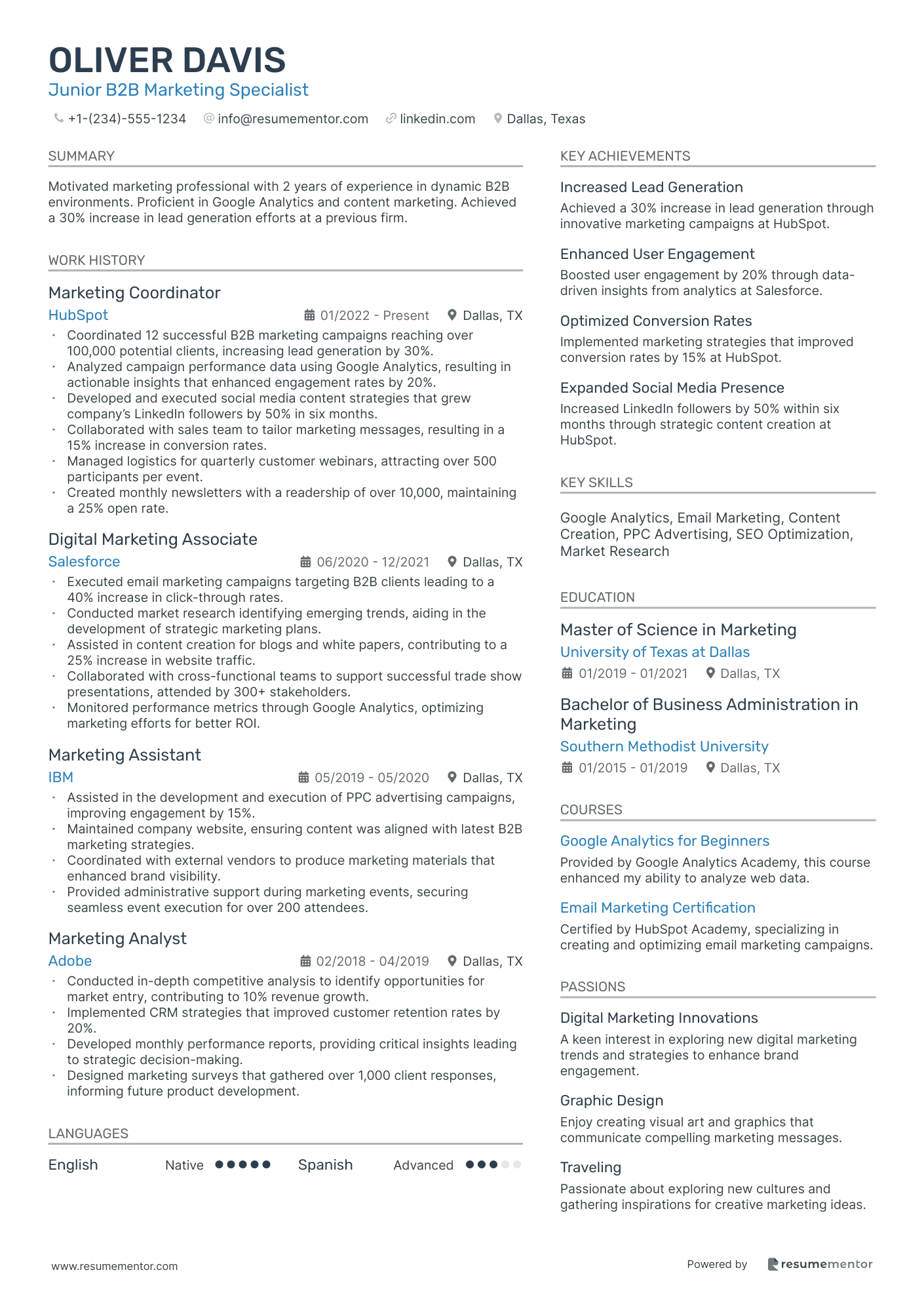
Junior B2B Marketing Specialist

Entry-Level Digital Marketing Specialist resume sample
- •Executed successful social media campaigns, increasing follower engagement by 25% across platforms in a single quarter.
- •Analyzed web traffic metrics using Google Analytics, optimizing SEO strategies and increasing website visits by 40%.
- •Managed cross-functional marketing projects, improving team productivity by 15% through effective task delegation.
- •Developed targeted email marketing campaigns that resulted in a 10% increase in open rates and 5% growth in conversion rates.
- •Collaborated with the design team to refresh online branding, which led to a 20% increase in brand recognition.
- •Supported the planning and execution of innovative content strategies, which enhanced user engagement by 30%.
- •Managed PPC advertising campaigns resulting in 15% lower cost-per-click, significantly improving ROI.
- •Conducted market research to identify customer trends, informing marketing strategies that boosted sales by 20%.
- •Enhanced email marketing strategies through A/B testing, achieving a 12% increase in customer engagement.
- •Collaborated with cross-functional teams to streamline campaign strategies, leading to a 10% improvement in efficiency.
- •Authored persuasive content for the company blog, increasing readership by 35% within six months.
- •Supported the execution of digital marketing campaigns, increasing conversion rates by 5% through strategic planning.
- •Assisted in managing social media accounts, successfully growing the company's online presence by 15%.
- •Prepared detailed marketing reports that informed and improved decision-making processes for future campaigns.
- •Coordinated with design teams to produce promotional materials that enhanced brand visibility by 10%.
- •Conducted competitive analysis, resulting in actionable insights that increased market share by 5%.
- •Utilized CRM tools to enhance customer relationship management, boosting customer satisfaction ratings by 7%.
- •Assisted in digital strategy development that improved lead generation by 20% through targeted campaigns.
- •Monitored social media trends, recommending improvements that increased engagement rates by 10%.
Entry-Level Content Marketing Coordinator resume sample
- •Enhanced overall user engagement by 30% through innovative blog content that resonated with target demographics.
- •Collaborated in cross-functional team efforts to launch a social media campaign boosting brand impressions by 50%.
- •Managed the content calendar ensuring timely delivery and scheduling for a 200% increase in content diversity.
- •Coordinated with designers to create aesthetically appealing posts, elevating audience interactions by 25%.
- •Demonstrated adept research skills, resulting in 10% improvement in content accuracy and relevance.
- •Streamlined the content creation process by implementing new tools and techniques leading to a 20% time saving.
- •Supported the execution of email marketing campaigns that resulted in a 15% increase in click-through rates.
- •Engaged with a diverse audience, resulting in a 40% growth in social media followers within one year.
- •Optimized SEO strategies that boosted blog traffic by 25% through enhanced keyword integration.
- •Assisted in developing a data-driven approach for content creation, leading to a 20% increase in efficiency.
- •Spearheaded a project that reduced publication lead time by 15% through an improved content management system.
- •Implemented social media strategies that increased audience engagement metrics by 20% on all platforms.
- •Contributed to creative content ideas improving brand authenticity and leading to a 10% rise in audience trust.
- •Facilitated content editorial meetings improving strategic alignment for future content goals.
- •Developed comprehensive competitor analysis reports providing actionable insights to the marketing team.
- •Crafted compelling copy for digital ads that increased click-through rates by 18% across various platforms.
- •Contributed to brand storytelling efforts enriching narrative consistency and engaging a broader audience.
- •Supported team initiatives leading to the successful launch of three promotional content series.
- •Led a project that standardized tonal guidelines improving cross-channel message cohesion.
Junior Social Media Marketing Analyst resume sample
- •Managed content creation and scheduling across five social media platforms, increasing follower growth by 40% within one year.
- •Developed and executed a successful social media campaign that boosted user engagement by 50%, leading to increased brand awareness.
- •Collaborated with the design team to create visually compelling promotional materials that achieved a 30% higher engagement rate.
- •Designed and implemented customer feedback loops on social platforms, reducing response time by 20% and improving customer satisfaction.
- •Analyzed social media metrics weekly, which resulted in a 25% increase in campaign efficiency by optimizing post timing and content strategy.
- •Engaged with online community to promote positive brand perception, achieving a 15% reduction in negative sentiment online.
- •Implemented digital marketing strategies leading to a 20% increase in website traffic through optimized social engagement.
- •Coordinated cross-platform promotions, boosting product visibility by 25% over three major product launches.
- •Monitored digital campaigns for trends and insights, resulting in a 15% improvement in ad click-through rates.
- •Assisted in the strategic use of social platforms to drive a 20% increase in lead generation with targeted content.
- •Tracked customer feedback and adapted content strategy to maintain a 30% engagement increase over two quarters.
- •Supported social media efforts leading to a 30% increase in user interaction through targeted content changes.
- •Managed a small-scale project that automated responses to common inquiries, saving 10 hours of manual work weekly.
- •Contributed to the development of social media guidelines that reduced posting errors by 15%.
- •Analyzed social media performance data, helping optimize strategies that led to a 20% improvement in social reach.
- •Supported the marketing team by assisting with social content schedules and tracking performance metrics for optimization.
- •Researched industry trends, contributing to a report that informed new strategies for increasing market presence.
- •Created a social media trend analysis report with insights that led to a 15% increase in engagement over three months.
- •Participated in team brainstorming sessions, contributing ideas that increased participation in community-driven promotions.
Entry-Level SEO Marketing Specialist resume sample
- •Boosted organic website traffic by 40% in six months by implementing new SEO strategies and keyword optimization.
- •Managed a project to redesign landing pages, resulting in a 50% increase in lead generation.
- •Developed an on-page SEO audit process that streamlined keyword targeting, improving search rankings by two positions.
- •Collaborated effectively with cross-functional teams to enhance content alignment with strategic SEO goals.
- •Analyzed search data using Google Analytics, identifying actionable insights and delivering monthly reports to senior management.
- •Comprehensively researched competitor strategies, revealing gaps in our digital presence and advised actionable tactics for improvement.
- •Executed a comprehensive SEO campaign that increased website visits by 35% within the first year.
- •Worked closely with developers to implement technical SEO recommendations, enhancing website load speeds drastically.
- •Prepared detailed performance reports, highlighting improvements and key areas for future focus.
- •Optimized blog content by conducting thorough keyword research, leading to a 20% increase in engagement.
- •Assisted with social media marketing campaigns, expanding brand awareness across platforms.
- •Conducted extensive keyword research to aid in developing potential content strategies.
- •Performed regular SEO audits, ensuring technical compliance and alignment with SEO best practices.
- •Supported marketing projects by coordinating between various stakeholders to achieve set objectives.
- •Assisted in optimizing website copy, contributing to increased readability and user engagement.
Junior Email Marketing Coordinator resume sample
- •Managed a portfolio of 15 clients, increasing email open rates by 25% through targeted content strategies.
- •Developed 20+ customized email templates, enhancing user engagement and boosting click-through rates by 18%.
- •Conducted A/B testing on key campaigns, resulting in an 8% increase in conversions by identifying optimal subject lines.
- •Ensured database segmentation accuracy, enabling more personalized marketing efforts and achieving a 12% increase in customer retention.
- •Collaborated with cross-functional teams to align email content with broader marketing strategies, enhancing brand consistency.
- •Utilized analytical tools to monitor campaign performance, leading to a 20% improvement in ROI by refining targeting techniques.
- •Spearheaded email marketing campaigns that contributed to a 30% increase in monthly outreach engagement.
- •Developed data-driven strategies, analyzing customer behavior to improve campaign effectiveness and boost conversions by 22%.
- •Directed the integration of HTML/CSS elements, improving email design aesthetics and driving user interaction up by 15%.
- •Regularly updated email lists, ensuring compliance with CAN-SPAM regulations, enhancing sender reputation scores by 10%.
- •Organized a comprehensive email marketing calendar to streamline campaign deployments, improving operational efficiency by 14%.
- •Assisted in coordinating multi-channel digital marketing campaigns, resulting in a 16% increase in overall engagement.
- •Optimized email marketing lists, generating a 10% increase in targeted audience reach and personalization.
- •Coordinated with designers to create visually appealing email content, improving campaign aesthetics and effectiveness.
- •Participated in strategy sessions to design more effective marketing funnels, improving conversion metrics by 12%.
- •Created engaging content for newsletters that improved click-through rates by 15% over quarterly benchmarks.
- •Supported the creation of marketing collateral, helping to maintain brand identity and consistency across channels.
- •Assisted in managing email databases, contributing to a 10% growth in subscriber base.
- •Worked closely with senior marketers to ensure alignment of email content with broader marketing initiatives.
Entry-Level Brand Marketing Associate resume sample
- •Developed and executed marketing campaigns, achieving a 30% increase in brand awareness over a year.
- •Collaborated with cross-functional teams to maintain brand consistency, resulting in a 20% improvement in customer satisfaction.
- •Conducted competitive analysis and identified market trends, informing strategies that led to a 15% rise in market share.
- •Created materials for promotional events, enhancing customer experience and driving a 25% uptick in attendance.
- •Organized and managed logistics for events, successfully engaging over 500 attendees and reinforcing brand loyalty.
- •Managed social media accounts, increasing follower engagement by 40% through regular interaction and content updates.
- •Assisted in launching a product campaign that generated $500k in revenue, exceeding sales forecasts by 10%.
- •Led a team in developing marketing materials, increasing digital footprint by 35% over a six-month period.
- •Analyzed marketing performance metrics, adjusting strategies to optimize campaign effectiveness with a 20% performance boost.
- •Participated in brainstorming sessions, introducing two innovative concepts that revitalized brand image.
- •Supported product development teams ensuring brand alignment, contributing to a 25% improvement in product-market fit.
- •Executed daily marketing tasks that improved team efficiency by 15% through systematic workflow management.
- •Assisted in creating diverse content for various platforms, enhancing online engagement rates by 20% over a year.
- •Conducted thorough research and assembled reports, leading to a more informed strategic planning process.
- •Coordinated marketing resources to support a major event, resulting in a successful launch attended by over 1,000 guests.
- •Assessed customer feedback to identify trends, assisting in the refinement of strategies for a 10% customer satisfaction increase.
- •Supported digital marketing initiatives, leading to a 15% increase in online traffic over six months.
- •Engaged with cross-functional teams to facilitate consistent brand messaging, enhancing team coordination.
- •Contributed to the execution of promotional events, achieving a 20% boost in event attendance and brand exposure.
Junior Product Marketing Specialist resume sample
- •Led a successful marketing campaign that increased product engagement by 40%, enhancing overall brand visibility.
- •Analyzed market trends and customer insights, improving product positioning and messaging accuracy significantly.
- •Collaborated with cross-functional teams to align marketing strategies with broader business objectives, boosting sales by 20%.
- •Managed digital marketing efforts, optimizing campaigns which resulted in a 25% increase in click-through rates.
- •Assisted in launching a new product line, coordinating events and promotions to ensure public awareness and interest.
- •Produced persuasive sales presentations used by sales teams, leading to enhanced client communications and deals.
- •Executed content marketing strategies resulting in a 15% increase in site traffic over six months.
- •Developed key promotional materials which directly contributed to a 10% uplift in product sales figures.
- •Conducted detailed market research and competitive analysis, providing insights to refine marketing approaches.
- •Supported social media initiatives, growing the brand's online presence by increasing followers by 30%.
- •Assisted in organizing a high-impact product launch event that attracted over 500 participants and media coverage.
- •Coordinated marketing initiatives that improved customer engagement metrics and feedback response times by 50%.
- •Assisted in revising product datasheets, enhancing their effectiveness in communicating product benefits.
- •Worked collaboratively with designers to develop digital assets utilized in multiple marketing campaigns.
- •Monitored and reported marketing campaign performance, enabling data-driven decisions that optimally allocated resources.
- •Supported the design and deployment of marketing campaigns that addressed target audience needs effectively.
- •Participated in brainstorming sessions, contributing innovative ideas that improved marketing strategies.
- •Developed and maintained engaging copy for online and print materials, increasing reader interaction rates.
- •Helped coordinate cross-promotional partnerships, leveraging relationships to enhance brand alliances.
Entry-Level Marketing Research Analyst resume sample
- •Led the analysis of consumer behavior metrics, resulting in a 15% increase in client revenue within one year.
- •Developed and implemented market research strategies that uncovered new business opportunities, significantly improving client targeting by 20%.
- •Created and presented comprehensive reports on market trends, driving strategic marketing decisions for a diverse portfolio of clients.
- •Collaborated with cross-functional teams to develop innovative approaches to data analysis that improved operational efficiency by over 30%.
- •Managed data collection processes that reduced analysis time by 25%, increasing overall productivity using SPSS software.
- •Conducted competitive analysis, providing insights that led to a 10% improvement in product positioning and audience engagement.
- •Executed thorough market research projects that identified key trends and opportunities, enhancing client strategic decisions.
- •Synthesized consumer data, providing actionable insights that improved client marketing strategies leading to 18% increase in market share.
- •Led a team to develop marketing presentations for stakeholders that resulted in a 25% increase in project funding.
- •Assisted in launching a new product line by analyzing historical data, contributing to a successful product debut.
- •Streamlined research processes, reducing data analysis lead times by 20%, significantly boosting project delivery timelines.
- •Coordinated a multi-channel marketing campaign that increased customer engagement by 30% over six months.
- •Conducted market analysis to identify new business opportunities, resulting in a 12% increase in sales revenue.
- •Developed marketing content tailored to client strategies, achieving a 25% increase in engagement rates.
- •Utilized Excel and database tools for precise data analysis, enhancing reporting accuracy by 15%.
- •Assisted in academic research projects, collecting and analyzing data that contributed to published studies.
- •Supported department in creating research strategies and processes, leading to efficient data management.
- •Presented research findings at academic conferences, improving department visibility by 10%.
- •Contributed to a team project that resulted in a 15% increase in research funding.
Entry-Level Affiliate Marketing Coordinator resume sample
- •Managed relationships with over 50 affiliate partners, enhancing engagement through tailored content, resulting in 35% increased partner activity.
- •Developed and executed marketing campaigns with cross-functional teams, achieving a 20% increase in customer acquisition.
- •Monitored affiliate performance data, generating actionable insights and leading to a 15% improvement in program efficiency.
- •Coordinated promotional materials, ensuring timely and accurate delivery to affiliates, with a focus on maximized campaign reach.
- •Prepared monthly performance reports with detailed analysis for stakeholders, contributing to strategic decision-making processes.
- •Implemented budget management strategies, resulting in a 10% reduction in program costs while increasing ROI by 5%.
- •Assisted in onboarding over 30 new affiliate partners by providing clear guidance and technical support.
- •Analyzed data trends to optimize affiliate strategies, leading to a 25% growth in partner-generated sales.
- •Collaborated with the content team to produce high-performing advertising materials for affiliates, leading to higher engagement.
- •Facilitated budget tracking and reconciled discrepancies, maintaining financial accuracy across marketing campaigns.
- •Stayed abreast of emerging industry trends, adapting strategies to maintain competitive advantage in the marketplace.
- •Developed effective marketing materials for affiliate partners, increasing click-through rates by 18%.
- •Managed multiple tasks simultaneously, maintaining organizational efficiency and ensuring timely project completion.
- •Participated in cross-functional meetings to align marketing objectives with overall company goals.
- •Utilized Microsoft Excel for data analysis, improving decision-making accuracy and enhancing campaign reporting.
- •Boosted social media presence by 30% through innovative content strategies and targeted marketing efforts.
- •Supported the marketing team in coordinating events, improving brand visibility and affiliate partner relations.
- •Maintained consistent communication with affiliates, providing necessary resources to ensure campaign success.
- •Implemented social media analytics tools to track performance metrics and improve engagement strategies.
Junior B2B Marketing Specialist resume sample
- •Coordinated 12 successful B2B marketing campaigns reaching over 100,000 potential clients, increasing lead generation by 30%.
- •Analyzed campaign performance data using Google Analytics, resulting in actionable insights that enhanced engagement rates by 20%.
- •Developed and executed social media content strategies that grew company’s LinkedIn followers by 50% in six months.
- •Collaborated with sales team to tailor marketing messages, resulting in a 15% increase in conversion rates.
- •Managed logistics for quarterly customer webinars, attracting over 500 participants per event.
- •Created monthly newsletters with a readership of over 10,000, maintaining a 25% open rate.
- •Executed email marketing campaigns targeting B2B clients leading to a 40% increase in click-through rates.
- •Conducted market research identifying emerging trends, aiding in the development of strategic marketing plans.
- •Assisted in content creation for blogs and white papers, contributing to a 25% increase in website traffic.
- •Collaborated with cross-functional teams to support successful trade show presentations, attended by 300+ stakeholders.
- •Monitored performance metrics through Google Analytics, optimizing marketing efforts for better ROI.
- •Assisted in the development and execution of PPC advertising campaigns, improving engagement by 15%.
- •Maintained company website, ensuring content was aligned with latest B2B marketing strategies.
- •Coordinated with external vendors to produce marketing materials that enhanced brand visibility.
- •Provided administrative support during marketing events, securing seamless event execution for over 200 attendees.
- •Conducted in-depth competitive analysis to identify opportunities for market entry, contributing to 10% revenue growth.
- •Implemented CRM strategies that improved customer retention rates by 20%.
- •Developed monthly performance reports, providing critical insights leading to strategic decision-making.
- •Designed marketing surveys that gathered over 1,000 client responses, informing future product development.
Embarking on a marketing career can feel like steering a ship into uncharted waters, and your resume is your compass guiding you toward new opportunities. It serves as a vital introduction to potential employers, especially when experience is limited. Highlighting your skills, passion, and potential in a crowded job market may seem challenging, but it's entirely achievable.
To make your enthusiasm and grasp of marketing concepts shine, tap into the storytelling techniques you know so well. Draw from your creative problem-solving experiences and contributions to projects, whether from school or volunteer work, and turn them into compelling narratives. These stories form the core of your resume, allowing you to present your analytical and creative talents effectively.
A well-structured resume format can make a world of difference, helping employers quickly grasp your potential. Here’s where a resume template becomes an invaluable tool. With a clear layout, your strengths and achievements can be easily highlighted, guiding the reader’s attention to what matters most. For design ideas that can enhance your marketing resume, explore resume templates for inspiration.
This resume-writing process is an opportunity to apply your marketing skills, crafting a document that tells the story of who you are as a budding marketer. By organizing your experiences into engaging narratives and using the right structure, you can confidently embark on the path to a promising career in marketing. This guide will support you in creating a resume that not only stands out but also truly captures your professional essence.
Key Takeaways
- Your resume serves as a vital introduction, especially when experience is limited, by highlighting your skills, passion, and potential in the job market.
- Use storytelling techniques to highlight creative problem-solving experiences and contributions to projects, either from school or volunteer work, in your resume to showcase analytical and creative talents effectively.
- Select a well-structured resume format and use modern, clean fonts to make your strengths easily identifiable, saving the resume as a PDF to maintain consistent formatting across platforms.
- In the experience section, emphasize measurable results and specific examples, using strong action words to illustrate your hands-on experience and tailor content to the job ad's demands.
- A balanced skills section highlights both technical prowess in essential marketing tools and soft skills like communication, adaptability, and problem-solving, revealing your readiness to contribute effectively in a marketing role.
What to focus on when writing your entry-level marketing resume
Your entry-level marketing resume should highlight how you can contribute creatively and strategically to a team’s goals. It should convey your grasp of marketing basics, your enthusiasm for the industry, and experiences that demonstrate your talent for engaging audiences and driving results.
How to structure your entry-level marketing resume
- Contact Information: Start with your full name, phone number, and a professional email address, ensuring recruiters can easily reach you. Including a LinkedIn profile or professional website can further showcase your brand and provide a deeper look into your capabilities.
- Objective Statement: This brief section should reflect your passion for marketing and your career aspirations—emphasize relevant skills like creativity, digital marketing expertise, and effective communication. Use this space to explain what draws you to the role and how you plan to grow within the marketing field.
- Education: Follow with your educational background, listing degrees and institutions, along with relevant courses like digital marketing, consumer behavior, or data analysis that align with marketing essentials. Mentioning academic projects or studies can illustrate how you’ve applied theoretical knowledge to practical scenarios.
- Relevant Experience: Demonstrate your applied marketing skills through internships, volunteer work, or part-time jobs. Include specific examples of projects, like managing social media campaigns or creating engaging content, to show hands-on experience. Highlight responsibilities that entailed strategic thinking or directly contributed to an organization’s marketing efforts.
- Skills: Highlight key marketing abilities such as content creation, social media proficiency, SEO knowledge, and data analytics. These are crucial for showing your potential in the marketing industry—focus on skills that you’ve put into practice and ones that are in demand.
- Certifications and Training: Wrap up with certifications related to marketing like Google Analytics or HubSpot Academy to underscore your commitment to learning and staying updated in the field. Such credentials not only add to your resume’s credibility but also differentiate you in a competitive job market.
As we delve deeper into each section, understanding how to format your resume effectively will ensure your strengths are unmistakably conveyed to potential employers.
Which resume format to choose
Crafting a resume for an entry-level marketing role begins with selecting a format that showcases your strengths effectively. The reverse-chronological format is the best choice, as it allows you to present your educational background and any internships in a clear, logical order. This helps employers see your growth and trajectory at a glance.
Font choice plays a crucial role in making your resume visually appealing and professional. Opt for modern, clean fonts such as Rubik, Lato, or Raleway. These fonts are easy on the eyes and lend a contemporary feel to your resume, which is vital in the marketing industry that values both creativity and clarity.
Saving your resume as a PDF ensures that your carefully crafted layout remains consistent across all platforms and devices. This is important because it avoids any potential formatting issues that could distract from the content of your application.
Finally, maintain a neat appearance with one-inch margins all around. This creates ample white space, making your resume easy to read and visually balanced. The right layout and format demonstrate your attention to detail, a critical skill in marketing.
Focusing on these resume elements helps you present a polished, professional front, ensuring potential employers see your potential and readiness to succeed in the marketing field.
How to write a quantifiable resume experience section
The experience section of your entry-level marketing resume plays a crucial role in grabbing a recruiter’s attention. It’s your chance to highlight practical skills and achievements that show your potential. By structuring this section around measurable results, you demonstrate how you’ve benefited past employers, which is what recruiters want to see. Start by listing experiences in reverse chronological order to keep things current and relevant. Focus on the last 5-7 years, honing in on roles and titles that line up with your target marketing position. Tailoring is key—use keywords from the job ad to show you understand the role’s demands. This approach makes your resume resonate more with what hiring managers are looking for. Employ strong action words like “boosted,” “managed,” “developed,” and “increased” to vividly illustrate your contributions. Here’s an example:
- •Increased social media engagement by 30% in three months by crafting compelling content and interactive posts.
- •Developed and implemented email marketing campaigns, contributing to a 20% rise in customer acquisition.
- •Managed cross-functional teams to ensure project deadlines were met, resulting in a 15% increase in campaign efficiency.
- •Conducted market research that informed product launch strategies, enhancing market reach by 25%.
This experience section stands out because it uses clear numbers to illustrate your impact, making your achievements tangible and memorable. Action words inject energy into your resume, drawing the reader in and effectively communicating your abilities. Such a focus on success over extensive experience is ideal for entry-level candidates. Tailoring your resume ensures it aligns with the specific needs outlined in job postings, giving you a competitive edge in the hiring process.
Project-Focused resume experience section
A project-focused entry-level marketing resume experience section should highlight the projects you've been involved in, showcasing the skills you've learned and the impact you've made. Begin by naming this section something like "Project-Based Work in Marketing" to emphasize its focus. Each bullet point should cover different tasks you've handled, skills you've honed, and results you've achieved. It's important to convey how your contributions have added value to your team, whether through innovative solutions, streamlined processes, or successful outcomes.
List the dates of your experience along with your role and the organization you worked with. If you weren't affiliated with a specific company, mention relevant freelance, volunteer, or academic projects. Every bullet should shine a light on a distinct accomplishment or skill, like managing social media campaigns, crafting marketing materials, or collaborating with diverse teams. It's crucial that you demonstrate how these experiences prepare you for your desired jobs and underline your potential to enhance any marketing team.
Intern
Bright Marketing Solutions
January 2022 - Present
- Developed and executed content strategies for social media platforms, boosting engagement by 30% in three months.
- Teamed up with the design crew to craft eye-catching marketing materials for online campaigns.
- Conducted market research to spot new trends and applied findings to content creation, improving audience targeting.
- Helped coordinate virtual events, leading to a 40% rise in attendee registration compared to past events.
Achievement-Focused resume experience section
A marketing-focused resume experience section should emphasize your achievements and the impact you’ve made. Focus on listing relevant experiences like internships, projects, or part-time roles that showcase your marketing skills. Use engaging language to describe the tasks you undertook, and enhance this by quantifying your successes with tangible metrics or feedback. Each bullet point needs to clearly communicate the value you added to an employer or project, closely linking your experience to the skills and responsibilities highlighted in the job posting.
To enhance readability, begin with your job title, accurately portraying your role, followed by the company name and your employment dates. Bullet points should outline your accomplishments in a precise and impactful manner, utilizing strong action verbs to make your contributions stand out. By weaving these elements together, you illustrate not only what you did, but also how your work benefited your employer and added to your professional growth.
Marketing Intern
Bright Future Marketing
June 2022 - August 2022
- Developed social media content strategies that increased engagement by 30%
- Assisted in organizing a promotional event attended by over 200 potential clients
- Conducted market research that provided insights now used in marketing campaigns
- Collaborated on a team project that resulted in a 15% increase in brand visibility
Industry-Specific Focus resume experience section
A marketing-focused resume experience section should highlight your skills in a way that aligns with the specific industry you're targeting. Begin by selecting a key focus or skill set, such as digital marketing tactics or customer engagement strategies, to guide your narrative. Clearly and concisely present your experiences while emphasizing your achievements and contributions. If your direct experience is limited, draw on relevant skills gained through internships, volunteer roles, or academic projects to illustrate your readiness for the industry. This approach can bridge any gaps in direct marketing experience, helping to demonstrate your potential.
Incorporate bullet points that effectively convey your actions and their impact. Focus on specific tasks, tools, or platforms you used, and quantify your achievements to enhance credibility. Numbers help paint a clear picture of your success. Carefully tailor each experience to show how it prepared you for the challenges and opportunities you’ll face in the marketing field. Use active, positive language to underscore your ability to contribute successfully to a marketing team and make meaningful contributions.
Marketing Intern
XYZ Marketing Solutions
June 2022 - August 2022
- Developed a social media marketing strategy that increased engagement by 30% over the summer.
- Assisted the team in launching email campaigns using Mailchimp, resulting in a 15% increase in open rates.
- Conducted market research to identify key trends and presented findings to senior managers, informing future campaign planning.
- Collaborated with the design team to create promotional materials that improved brand visibility.
Problem-Solving Focused resume experience section
A problem-solving-focused marketing resume experience section should clearly highlight your ability to identify and address marketing challenges. Begin by detailing tasks that showcase your problem-solving skills, such as analyzing campaign performance or adjusting social media strategies for improved results. Use action verbs in each bullet point to vividly convey the impact of your work, emphasizing the achievements and benefits for the project or company. This narrative demonstrates to potential employers how you think strategically and creatively in real-world situations.
Connect each experience to the skills and achievements that are most relevant. Describe a project by explaining the challenge you encountered, the actions you took, and the positive outcomes. This approach goes beyond merely listing duties; it tells a story of how you made meaningful contributions. By focusing on your problem-solving abilities, you underscore your readiness to add value in future roles, showing your capacity to tackle challenges effectively.
Marketing Analyst Intern
Bright Ideas Marketing Co.
June 2022 - Present
- Analyzed weekly performance metrics to improve underperforming social media campaigns, leading to a 15% increase in engagement.
- Developed and implemented A/B testing strategies, boosting email open rates by 10%.
- Worked with the design team to enhance ad creatives, driving a 20% rise in conversion rates.
- Led a competitive analysis project, identifying market gaps that informed strategic shifts in product positioning.
Write your entry-level marketing resume summary section
A marketing-focused resume summary should offer a snapshot of your strengths and achievements in a way that connects your skills to the employer's needs. For an entry-level marketing role, highlight your education, skills, and any hands-on experience. You want to show how your background fits what the company is looking for. Consider this example for a resume summary:
This summary brings together your education, interest in digital marketing, and hands-on experience. Your skills in analytics show employers you can contribute right away. Acknowledging your teamwork abilities and eagerness to learn assures them of your growth potential. It's essential to use positive, active language to convey enthusiasm. When choosing between describing yourself with a summary or an objective, consider your background. A summary outlines existing experience and skills, fitting for those with some background. In contrast, an objective focuses on career goals, ideal when you're just starting out. A resume profile tends to be more personal, while a summary of qualifications highlights key skills. Pick the format that best matches your experience and where you aim to go in your career.
Listing your entry-level marketing skills on your resume
An entry-level marketing resume skills section should highlight your potential to contribute effectively in a dynamic role. Your skills can stand alone or blend seamlessly into other sections like experience and summary. This section should reflect both your strengths and soft skills, demonstrating your ability to communicate and adapt in a professional environment. Meanwhile, hard skills form the technical backbone of your capabilities, showcasing mastery in specific software or marketing techniques.
Incorporating skills and strengths as keywords is crucial for getting your resume noticed. These keywords are what recruiters often search for, helping you make an impression with both employers and their digital systems. Having a standalone skills section makes this even clearer, presenting your abilities in a focused and organized way. Here's an example of how that might look:
This skills section is effective as it balances technical prowess with communication skills, both essential for marketing roles. It’s concise yet comprehensive, making it easy for recruiters to understand your qualifications.
Best hard skills to feature on your entry-level marketing resume
Building your resume with strong hard skills showcases your technical expertise, developed through education and practice. These skills are indicators of your ability to contribute to effective marketing campaigns. Some of the most sought-after hard skills are:
Hard Skills
- SEO Optimization
- Data Analysis
- Google Analytics
- Social Media Strategy
- Email Marketing Platforms
- Content Management Systems (CMS)
- Adobe Creative Suite (Photoshop, Illustrator)
- Video Editing
- CRM Software (e.g., Salesforce)
- HTML/CSS basics
- Copywriting
- Market Research
- Microsoft Office Suite Proficiency
- Pay-Per-Click (PPC) Advertising
- E-commerce Platforms (e.g., Shopify)
Best soft skills to feature on your entry-level marketing resume
Soft skills are equally important and demonstrate how you can work well with others and adapt to various situations. In entry-level marketing, these skills highlight your potential to thrive in team settings and manage diverse challenges. Employers value the following soft skills:
Crafting your resume with a clear focus on these skill sets ensures you stand out to potential employers and present yourself as a well-rounded candidate ready to take on the challenges of the marketing world.
Soft Skills
- Communication
- Creativity
- Adaptability
- Problem-Solving
- Team Collaboration
- Attention to Detail
- Time Management
- Critical Thinking
- Customer Service Orientation
- Emotional Intelligence
- Leadership Potential
- Initiative
- Persuasiveness
- Listening Skills
- Networking Skills
How to include your education on your resume
The education section of your resume is important for showcasing your academic background, particularly for entry-level marketing positions. This section should be tailored to reflect your qualifications for the specific job you're applying for. It's best to exclude any irrelevant education. When listing your degree, include the degree type, major, institution, and date of graduation. If your GPA is impressive, list it alongside your degree. If you graduated with honors, such as cum laude, be sure to indicate this.
Here's an example of an incorrect education section:
And here is a well-structured education section:
- •Graduated Cum Laude
The strong example focuses on qualifications relevant to a marketing role, including a degree directly related to the field. Explicit mention of a high GPA and cum laude honors strengthens your profile and makes it more appealing to potential employers. This targeted, relevant information will help you stand out in the hiring process.
In Conclusion
In conclusion, crafting an entry-level marketing resume is more than just listing your qualifications; it's about painting a vivid picture of your potential and accomplishments. By creatively structuring your resume, you show prospective employers your capability to think strategically and innovate. Clear sections on education and skills demonstrate your preparedness for real-world challenges. When you highlight quantifiable achievements and project experiences, you not only tell a compelling story but also prove your readiness to make a meaningful impact. Tailoring your resume for each position is crucial, aligning your experiences with the job description's needs. The combination of hard and soft skills ensures you present a well-rounded profile capable of thriving in dynamic environments. Incorporating storytelling techniques turns your resume into a narrative that captivates recruiters. Ensuring a polished design and coherent format reflects attention to detail and professionalism, key traits in the marketing field. Ultimately, this approach empowers you to confidently navigate the job market, turning the resume from a mere document into a strategic tool that opens doors to exciting career opportunities.
Related Articles

Continue Reading
Check more recommended readings to get the job of your dreams.
Resume
Resources
Tools
© 2026. All rights reserved.
Made with love by people who care.

